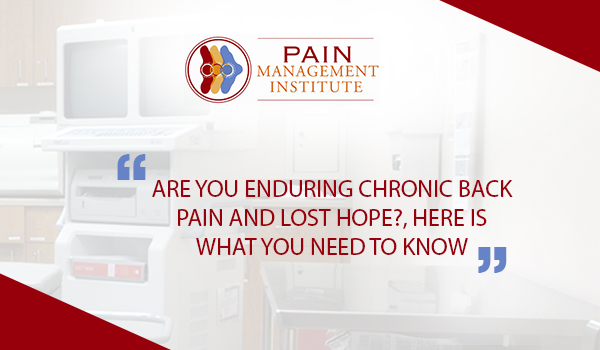After years of enduring tormenting chronic back pain and being told there was no probability of improvement CiaraCollins of New York finally got her happy days back, thanks to unique treatment she received at The Pain Management Institute. The excruciating pain was due to chronic nerve damage the 28 year old mother of two, encountered after several lower spine surgeries she has undergone five years earlier. Doctors informed her that there is no treatment that can help with the pain and she has to endure it for the rest of her life. The candle of hope lightened when Ciara met Dr. Zaki Anwer, MD, the Pain Management Institute, where she was implanted with Intrathecal Pain Pump to manage her debilitating chronic pain
Ciara had travelled to visit Dr. Zaki Anwer, MD, a pain management specialist, after loosing hopes by several other doctors. Dr. Zaki Anwer, MD, tried a few treatment options including injections and medications. However, after no results he suggested an Intrathecal pain pump trial, a procedure in which a small amount of Opoid pain medication is injected into the epidural space, the trial was exceptionally successful for reducing Ciara’s pain and Dr. Zaki Anwer, MD, referred her a permanent placement of Intrathecal Drug Pump at Pain Management Clinic
The Pain Management Institute is a collaborative, multidisciplinary effort to alleviate pain and restore function by application of technology and medicine,” says Dr. Zaki Anwer,MD, “For the suitable candidate the spinal cord stimulation or Intrathecal Pain Pump therapy can potentially reduce pain and improve the quality of life”
The Intrathecal pain pump therapy is a treatment option for patients enduring chronic pain that does not respond to other treatment options. The is a hockey puck sized that is surgically implanted into the abdomen and works by pumping medications straight the area where the spinal cord is found, also known as the Intrathecal Space. The medication then affects the pain receptors in the spinal cord and the brain to reduce the pain.
Since the medication is released continuously, it is much more effective than oral. Consequently, less medication is taken to manage the pain and the patients are likely to experience fewer side effects, such as nausea, drowsiness, constipation and mental fogginess
Following a successful surgery of having implants Intrathecal Pain Pump and weeks later refilled with medications, Ciara was finally able to manage her pain. She praises the dedicated yet sympathetic staff of the Pain Management Institute helping her get back her happiest days. “Dr. Zaki Anwer, MD, gave me something that I lost hope of, the light of hopes after a very dark period” said Ciara, “My words are limited to express how thankful I am to have an amazing Pain Management Specialist’s care for me”

